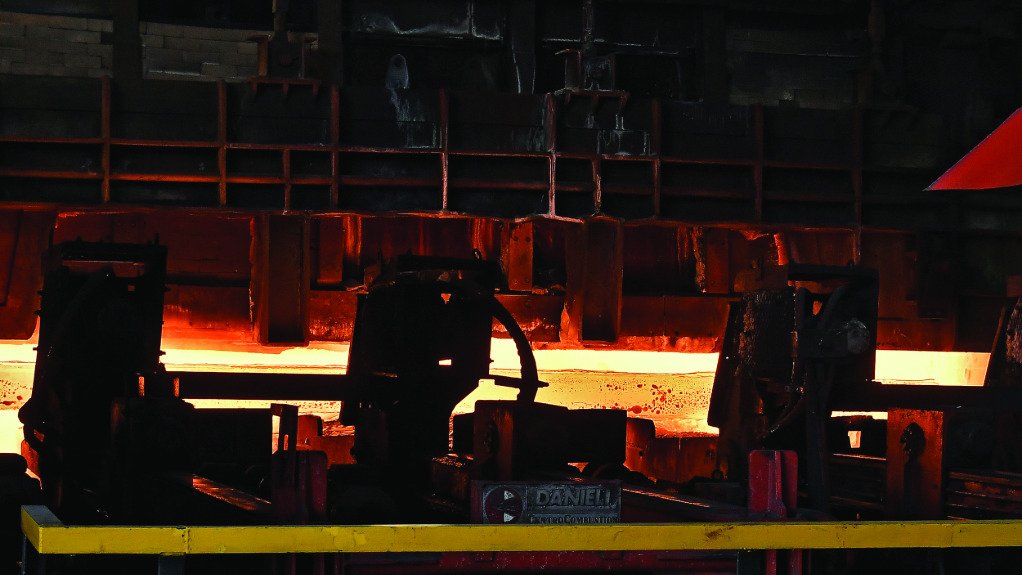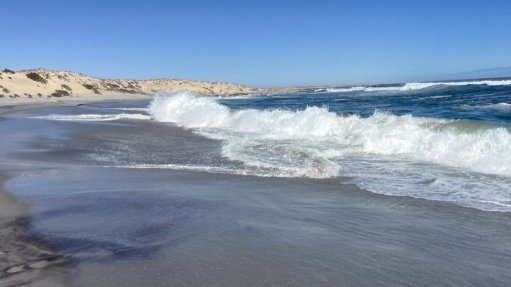No reprieve likely this time after talks on Newcastle mill’s survival fail


ArcelorMittal Rail and Structural, pictured, will also be shut when Newcastle closes
Photo by Creamer Media
The failure of a task team established to chart a survival strategy for ArcelorMittal South Africa’s (AMSA’s) Newcastle Works, in KwaZulu-Natal, culminated in the JSE-listed steel group notifying government on December 21 that it would shut the operation by the end of January.
At the time of the official announcement on January 6, AMSA had not yet received any reaction from government and Engineering News was unable to immediately secure a response from the Department of Trade, Industry and Competition (dtic) regarding the development.
Comprising representatives from the dtic, the National Treasury, the South African Revenue Service, the Competition Commission, the International Trade Administration Commission of South Africa, Transnet, Eskom and AMSA, the task team met until late last year to deliberate on a range of issues that AMSA had identified as impediments to the mill’s survival.
These issues are well known, given that they were first highlighted in November 2023, when AMSA initially announced its intention to shut the operation that produces about 1-million tons yearly; a move the steel group later delayed after government called for further consultations in a bid to find solutions.
No reprieve is likely this time, though, with CEO Kobus Verster saying that, despite “good discussions, nothing concrete was put on the table”.
Besides high and rising rail and electricity costs, AMSA sought policy changes to counteract both weak market conditions and rising imports, including further protection beyond that which it already enjoys.
In addition, it sought a commitment that changes would be made to government’s scrap-metal policy, arguing that the policy had placed Newcastle, which produces steel from iron-ore using blast-furnace technology, at a disadvantage relative to steelmakers that use electric arc furnaces, often referred to as mini mills, which use scrap.
Specifically, AMSA wanted the price preference system (PPS) for scrap metal to be adjusted and the 20% export tax on scrap to be reduced to 5%.
Such changes, Verster argued, would have reduced the discount to mini mills and bolstered Newcastle’s relative competitiveness.
Verster estimates the discount at 40%, while proponents of the scheme suggest it is closer to 20%, and highlight the fall in long product prices to downstream steel consumers relative to flat steel, where AMSA is the dominant market participant.
Asked whether government could have done more to avert the closure, he made specific reference to the scrap policy, saying: “If that [scrap] benefit was not there, then Newcastle would be able to survive because … prices cannot be pushed below its cost of production.”
As things stood, however, Newcastle had become unviable and a serial lossmaker and a decision was made to stop the “cash burn” associated with the long-products unit, which had hitherto comprised 35% of AMSA and which supplies mainly into the infrastructure and construction markets.
FAR-REACHING CONSEQUENCES
The consequences are far-reaching, with 2 200 direct employees and a further 1 300 indirect jobs affected, with Section 189 processes being initiated.
There are also knock-on effects for downstream consumers of Newcastle material, including internal consumers at AMSA’s Vereeniging Works, in Gauteng, as well as the ArcelorMittal Rail and Structural unit, located at the old Highveld Steel facility, in Mpumalanga.
The socioeconomic implications for Newcastle are likely to be serious, with the mill being a key source of employment and spin-off economic activity for the town, whose relative isolation from markets and sources of raw material has been an ongoing problem; one amplified as Transnet Freight Rail’s service collapsed in recent years.
Together with various other structural problems, including weak markets and rising Chinese imports, this locational disadvantage made any restart of the operation, once closed, “highly unlikely”, Verster acknowledged.
There was no intention, though, to scrap or cannibalise the plant, which will be placed under care and maintenance in line with the approach taken at Saldanha Steel, which was mothballed in 2020. Verster insisted that the Western Cape plant could be reopened easily should market dynamics improve.
Post the closure of its longs division, AMSA’s market share is likely to fall to about 40% from just over 50% currently and the downsized company will turn its attention solely to the flat-steel markets of South Africa, as well as Southern and East Africa.
“Once we deal with the cash burn from our long business, we can redirect real investment into the flat business, where we've identified a range of projects which either give an immediate and substantial cost advantage or move us up in terms of the quality value-chain,” Verster said.
The long-mooted restarting of the Thabazimbi iron-ore mine could also be prioritised.
“Once you address your profitability and your balance sheet, suddenly these options become available … but to the extent that you have 35% of your business always lossmaking and at risk, it does impact on your ability to actually direct investment to where it's most logical,” he added.
Article Enquiry
Email Article
Save Article
Feedback
To advertise email advertising@creamermedia.co.za or click here
Press Office
Announcements
What's On
Subscribe to improve your user experience...
Option 1 (equivalent of R125 a month):
Receive a weekly copy of Creamer Media's Engineering News & Mining Weekly magazine
(print copy for those in South Africa and e-magazine for those outside of South Africa)
Receive daily email newsletters
Access to full search results
Access archive of magazine back copies
Access to Projects in Progress
Access to ONE Research Report of your choice in PDF format
Option 2 (equivalent of R375 a month):
All benefits from Option 1
PLUS
Access to Creamer Media's Research Channel Africa for ALL Research Reports, in PDF format, on various industrial and mining sectors
including Electricity; Water; Energy Transition; Hydrogen; Roads, Rail and Ports; Coal; Gold; Platinum; Battery Metals; etc.
Already a subscriber?
Forgotten your password?
Receive weekly copy of Creamer Media's Engineering News & Mining Weekly magazine (print copy for those in South Africa and e-magazine for those outside of South Africa)
➕
Recieve daily email newsletters
➕
Access to full search results
➕
Access archive of magazine back copies
➕
Access to Projects in Progress
➕
Access to ONE Research Report of your choice in PDF format
RESEARCH CHANNEL AFRICA
R4500 (equivalent of R375 a month)
SUBSCRIBEAll benefits from Option 1
➕
Access to Creamer Media's Research Channel Africa for ALL Research Reports on various industrial and mining sectors, in PDF format, including on:
Electricity
➕
Water
➕
Energy Transition
➕
Hydrogen
➕
Roads, Rail and Ports
➕
Coal
➕
Gold
➕
Platinum
➕
Battery Metals
➕
etc.
Receive all benefits from Option 1 or Option 2 delivered to numerous people at your company
➕
Multiple User names and Passwords for simultaneous log-ins
➕
Intranet integration access to all in your organisation


















